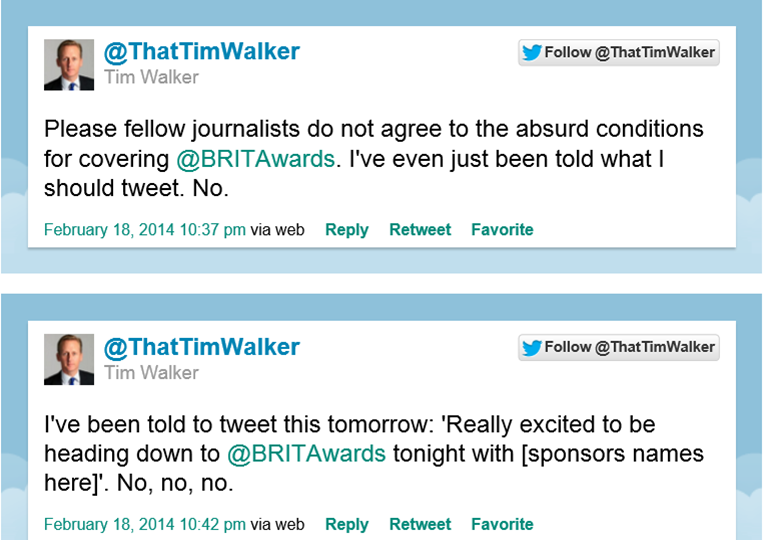Twitter has hit the headlines again this week. The Brits sponsor Mastercard asked journalists attending the awards to tweet plugs in return for tickets. You can read more about this on the Huffington Post.
Unsurprisingly, the journalists didn’t appreciate being treated as content robots and took to Twitter to complain.
There’s a great round up of more tweets from the #PricelessSurprises hashtag on The Drum. Probably not quite what the PR agency who made the request were hoping for.
I’ve read a number of articles saying how the incident shows the true nature of PR. I don’t think that’s the issue (and I know PR is an incredibly valuable tool- it’s one of the areas I work in). Asking journalists to do this misses the point of social media- you can’t make people say exactly what you want on Twitter. If the agency wanted positive tweets about Mastercard, it would have been a much smarter move to concentrate on giving journalists a good experience of the awards. This would involve making sure they had everything they needed to write their stories (e.g. access to celebrities they wished to interview), key information and looking after them like any other guest.
It’s also reinforced something else that I’ve learned over the years; the solution to doing social media well is sometimes offline. Not only did the agency misunderstand the role of social, they also treated the relationships with the journalists in a transactional way. That would have been a mistake with or without social media.
Here are three things which this incident demonstrates about social media:
- If your call to action involves social media, that doesn’t mean the normal rules about relationships go out of the window. Relationships via social media need to be valued and nurtured in the same way you would offline.
- If you want people to say something positive about your brand on social media, then give them a good experience. And accept that people will never say exactly what you want them to. The upside is that if you look after them their feedback may be even better than you could have hoped for.
- When planning a campaign with a hashtag, be prepared that it may get hijacked, as with #PricelessSurprises . This can happen due to circumstances outside your control; for example, at a charity conference last year the hashtag was invaded by spambots. Just as you have a crisis comms plans, have an idea of what you might do if your hashtag gets hijacked.
What else do you do to nurture relationships via social media?

